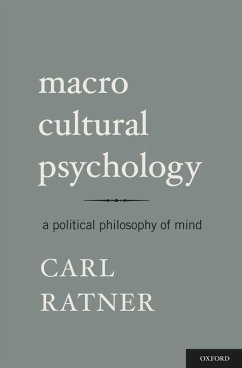This book articulates a bold, new, systematic theory of psychology, culture, and their interrelation. It explains how macro cultural factors -- social institutions, cultural artifacts, and cultural concepts -- are the cornerstones of society and how they form the origins and characteristics of psychological phenomena. This theory is used to explain the diversity of psychological phenomena such as emotions, self, intelligence, sexuality, memory, reasoning, perception, developmental processes, and mental illness. Ratner draws upon Lev Vygotsky's sociocultural psychology, Bronfenbrenner's ecological psychology, as well as work in sociology, anthropology, history, and geography, to explore the political implications and assumptions of psychological theories regarding social policy and reform. The theory outlined here addresses current theoretical and political issues such as agency, realism, objectivity, subjectivism, structuralism, postmodernism, and multiculturalism. In this sense, the book articulates a systematic political philosophy of mind to examine numerous approaches to psychology, including indigenous psychology, cross-cultural psychology, activity theory, discourse analysis, mainstream psychology, and evolutionary psychology.
Dieser Download kann aus rechtlichen Gründen nur mit Rechnungsadresse in A, B, BG, CY, CZ, D, DK, EW, E, FIN, F, GR, HR, H, IRL, I, LT, L, LR, M, NL, PL, P, R, S, SLO, SK ausgeliefert werden.


